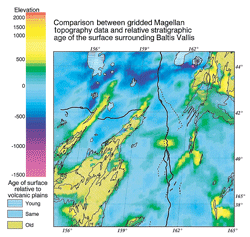GIS Across the Campus
 |
| Brown University uses GIS to study Venus. |
Currently more than 6,500 colleges and universities worldwide use Esri GIS software for research, teaching, and administrative purposes. Many institutions have realized that integrating GIS use across these three areas in an enterprisewide system can leverage investments in both data and hardware.
The same characteristics that make GIS an invaluable tool for government and business also benefit colleges and universities. GIS promotes data sharing, avoids duplication of effort, and realizes cost savings. Using a GIS framework aids in organizing, accessing, and visualizing data and developing information. Better access to information can translate into better decisions. Whether pursuing marketing efforts or community outreach activities, better information management can also aid communications with the public.
A Versatile Research Tool
At many institutions, GIS was initially adopted as a research tool. In addition to the academic fields that are obvious candidates for GIS—the natural sciences, natural resource management, landscape architecture, geology, and agriculture—other departments such as public health, social sciences, business, military science, law, and engineering have benefited from GIS. More than 70 disciplines and departments incorporate GIS in their programs. GIS gives researchers in these fields sophisticated tools for analyzing and displaying data, developing and testing models, and integrating data from many sources to define and solve problems.
Many universities and colleges actively promote GIS use across the campus. At Stanford University in California, the Branner Earth Sciences Library and Map Collections encourages faculty use of GIS for research. In addition to providing access to geospatial data, digital map services, and GIS, its staff supplies ongoing reference, research consultation, and instruction services. Departments lacking GIS resources may use GIS programs at the Branner library.
Powerful Teaching Aid
Not only has GIS become a standard research tool, but educators have also found that it is a tremendously effective teaching aid. Acquiring, evaluating, and analyzing data using GIS encourages critical thinking and helps students develop problem solving skills. The ability to integrate many types of data in a spatial framework also makes it an ideal vehicle for interdisciplinary studies. Courses that take advantage of this aspect of GIS aren't limited to the sciences. At Northwest Mississippi Community College, freshmen receive instruction in geospatial concepts and GIS software in addition to subject-specific problem-based learning exercises for research projects in sociology, political science, and other liberal arts curriculum disciplines.
Meeting the Demand for GIS
The increasingly pervasive use of GIS in both the public and private sectors has created a demand for GIS education and training. GIS programs run the gamut from vocational courses that emphasize basic GIS education and skills to more traditional academic courses that provide a robust mathematical and scientific foundation for GIScience.
The Polis Center at Indiana University-Purdue University Indianapolis (IUPUI) supports GIS use across the campus by supplying software application training, conceptual training, and curriculum development. Courses, whether practical or theoretical, are often tailored to the needs of specific disciplines. Projects and programs developed by The Polis Center, such as the Electronic Cultural Atlas Initiative (ECAI) and the Social Assets and Vulnerabilities Indicators (SAVI) project, centralize resources for many disciplines. ECAI, a Web-based interactive atlas of cultural data, uses time-enabled GIS data and is the result of an international collaborative effort. SAVI is a comprehensive electronic database of mapped and tabular data that describes the nine-county Indianapolis Metropolitan Statistical Area (MSA).
Continued on page 2
|